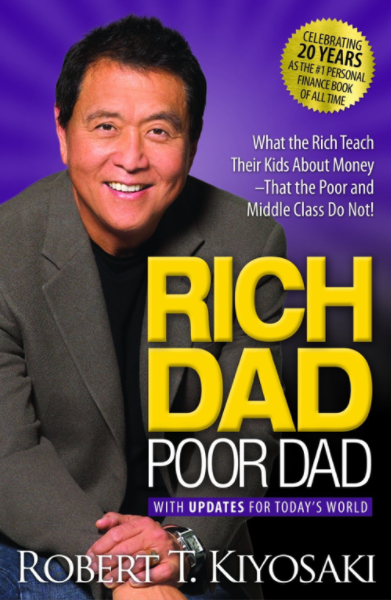Robert Kiyosaki is most renowned and well known for his global phenomenon, Rich Dad Poor Dad, which has had an impact on the personal finance, self-help and business industry.
There aren’t many who haven’t heard of this book, and below, we’ll explain how it has garnered its success and how the book has helped its readers everywhere redefine their lives, become richer, and have a healthy mindset and relationship with money.
Rich Dad Poor Dad Summary
Rich Dad Poor Dad is so simple, yet so complex in it’s message. the entirety of the book can be summed up in one short phrase, “invest in assets” yet it does not do the entire book justice.

Below, we will go over the main topics and themes of the book, and the best examples and lessons learned that made everyone question the way they were working, spending money, or even their approach to life.
The book is a contrast between Robert’s two father figures that influenced his life growing up. His traditional government job and school educated-father was contrasted by his friend’s father, which was a successful entrepreneur that owned several small business, and seemed to have many lessons for Kiyosaki and his friend about life and money.
Naturally, Kiyosaki spent more time with his friend and his “Rich” dad, and learned invaluable lessons that only someone who has tried and failed at many endeavors could do. With those lessons, came the secret to a wealthy upbringing and becoming rich
Rich Dad Poor Dad: A very real guide to truly becoming wealthy
Millionaires aren’t made overnight, and often, it is not for a lack of money. Kiyosaki’s “Poor” dad, his biological father, was not “poor” in the slightest sense. Later on, it is revealed through the mindset change in this narrative that “poor” really means a “poor” mindset rather than being in poverty.
Kiyosaki’s father was a well-educated man. He owned his house. He had discipline for his child. He did everything a father should; educated his child and continuously pushed him to be the best academically so that he could get a government job and eventually, a respectable salary as he climbed the government ladder.
Kiyosaki wasn’t convinced this was the only way. He saw it at his friend’s house. Kiyosaki’s “Rich” dad was always busy. People met with him on his terms. Kiyosaki first saw the sheer power of his “Rich” dad when there was a line of workers queued up outside his office, waiting for a chance to meet with him. Kiyosaki himself was waiting in such a line, in order to get mentorship from his “Rich” dad. He thought to himself, “wow, if anyone is successful and powerful, it’s this guy”
Rich dad poor dad can be broken down into three main lessons, 1. Your employer isn’t responsible for your wealth 2. Your biggest expense is taxes 3. Money should always be used to buy assets and not liabilities. Without spoiling the awesome parables that Kiyosaki has for you, let’s go over each lesson in detail.
Your Employer isn’t Responsible For Your Wealth
One of the most impactful stories of Rich Dad Poor Dad was a lesson Kiyosaki learned while of elementary school age. He was working for his “Rich” dad at one of his stores, and was responsible for making some sales, but mostly to organize and clean the store with new and existing stock.
Kiyosaki’s “Rich” dad would come in every week and lower his student’s hourly wage. Of course, Kiyosaki was furious, and eventually, “Rich” dad lowered his pay to nothing.
Kiyosaki was flabbergasted. He had been working longer hours every day to hopefully get more of a promotion or a raise, and the opposite happened. Kiyosaki had a growing comic book collection, and was extremely furious and upset that he couldn’t buy anymore.
He got together with his friend and brainstormed ways to earn money, now that they were both working for absolutely no compensation. they came up with a brilliant idea. All of their earnings thus far were sunk into comic books, so the boys pooled together their merchandise and set up a “library” in the basement at one of their houses.
They charged admission in this basement library, and during that time, the children that came in could read as many comic books as they want. The boys even took the idea a step further and made it passive, they paid Mike’s sister a fraction of their earnings to sit there and make sure that no one was stealing, vandalizing or causing trouble.
Kiyosaki returned to his “Rich” dad and said he didn’t want the job anymore. Rich dad even offered 20$/hour, a wage that was exponentially higher than any child would ever see, yet Kiyosaki refused. Lesson number one learned, always find your way to wealth, and never rely only on your employer.
Your Biggest Expense are Taxes
Kiyosaki would later learn from his Rich dad that the “Rich” found legal ways to pay less taxes than a regular earner. He learned that by incorporating himself, and setting up multiple businesses, you could list your expenses and protect yourself from a lot of liability rather than owning everything yourself. Your corporate tax rates would be lower, and also, all expenses incurred during the acquisition of clients and business conduct would reduce the amount you owe to the government. This very important lesson is one we should all learn, regardless of the country we are in. This theme also ties in with lesson #3 – which we will go into below.
Use Money to Buy Assets, Not Liabilities
Money that you earn, through employment earning, business earnings or otherwise, should always be invested into assets and not liabilities after paying your required expenses. Now, what does this mean? An asset is something that adds value to your life and also appreciates in value. A liability depreciates.
For example, at the time, a home was thought of as a liability. It’s an enormous object that you live in and have to pay the bank in exchange for loaning you the money to live there. Most of us cannot pay that loan back for 25-30 years.
Kiyosaki postured that this could be turned into an asset, such as buying a duplex, renting out one side, and living in the other. In that way, some or all of your house expenses are covered, while the land and building appreciate in value.
Other things, such as cars, depreciate in value quickly and indefinitely. However, if you have purchased enough assets (stocks, real estate and business) that bring you an extremely positive cash flow that would more than cover your car payments, then purchasing a vehicle through your company, and not yourself could be turned into an asset.
The depreciation, gas, and insurance write-offs, covered with the other cash flows would essentially make an Aston Martin feel like a free purchase. The entirety of the book can be summed up here; once your passive income surpasses your recurring expenses, you are now considered RICH.
Who Should Read Rich Dad Poor Dad?
The absolute beauty of this book is that it’s made for everyone. Even children, through some of the early parables, could begin to understand and explore some themes of financial independence. If Kiyosaki, at elementary school age, built his own comic book library business with the earnings from a store, then anyone can be wealthy.
Rich Dad Poor Dad Review: Good, or Bad, Should I Get It?
All of Kiyosaki’s themes are extremely important to financial literacy that we all need. It is very interesting that, although Kiyosaki’s father was much more intellectually educated than his “Poor” dad, the “Rich” dad commanded more respect, authority and was prepared for many more situations than his “Poor” dad.
It shines a light at our education system and begs the question, “Why aren’t more children taught about financial independence?” from an early age. Rich Dad Poor Dad is a book that is worth hundreds of times over what it costs, it changes your mindset, changes your earning potential and changes your life.

